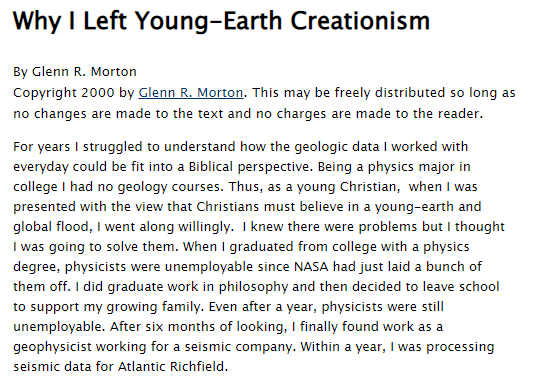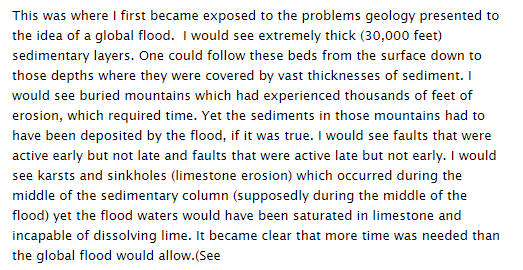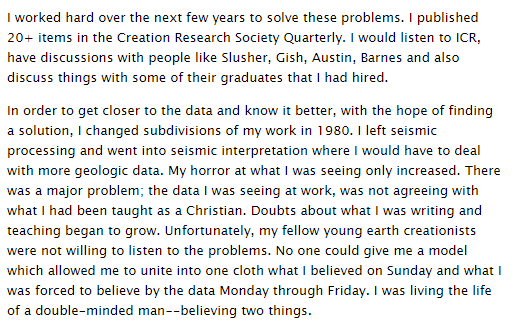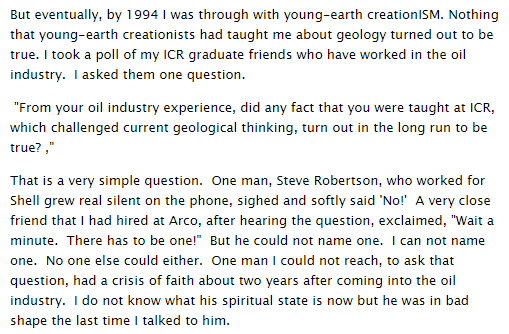And yet you spread exactly those bad wrguments by ignoring the context and written account of the Bible in order to support the interpretation of individuals who have those interpretations based on hypothesies that start with their is no God!"
This is incorrect on several points. Old-earth and evolutionary views do not start with the premise that God does not exist. On the contrary, most of the geologists who developed the modern understanding that the earth is quite old were Christians. The approach of workers such as Ussher, in seeking to create the best possible history of the earth by assembling all of the available data, led into modern old-earth geology as physical evidence was added to the written records. The modern young-earth movement is not a continuation of historical Christian views; this is a mistake based on the false dichotomy of young earth versus old earth. In reality, both young earth and old earth views fall into multiple categories. The old earth views based on assuming countless cycles (e.g., Hinduism, or many 18th-century deists) have no particular connection to modern geology, which reflects the geologic evidence for a long but finite and directional but humanly unpredictable history for the earth. Likewise, pre-1600’s young-earth views often put more emphasis on a figurative or symbolic interpretation of the days of creation than on any historical interpretation. Before the 1800’s, young-earth views often reflected “that’s all the good historical evidence we have, but if additional data come along, we’ll just add that in”, not the militant “nothing can possibly change my commitment to a young-earth position” attitude that functions as a legalistic false gospel in much of modern creation science. Thus, we see geologists of the 1800’s often appealing to the geological evidence for an old but finitely aged earth as evidence in favor of the Bible against deistic to atheistic cyclic models of history. Similarly, the first book to publish pictures reconstructing scenes from a series of geological ages concludes with a picture of Eden. Christians examined the accumulating evidence from geology, saw that it plainly pointed to a lengthy pre-human history, and figured that the additional time belonged somewhere before the creation of humans. This was not seen as a problem for the reliability of the Bible, and many early 19th-century geologists speculated that Noah’s Flood might be the most recent of the many apparently catastrophic events recorded in the geologic record. It was not until the mid-1800’s that it became clear that the geologic evidence for the most recent major geological changes better matched the effects of glaciers than of floods.
Nor am I the one who is ignoring context. The purpose of the Bible is theological, not scientific. The fact that Genesis 1 is talking about creation is no excuse to ignore that. Even the “historical” books are selecting incidents out of Israel’s history to illustrate theological principles, not aiming to teach us all about the historical statistics relating to the nation. That does not mean that the Bible is historically or scientifically inaccurate. But it is often imprecise when precision is irrelevant to its purpose. It omits many details that a historian or scientist would want to know; after all, we can research the evidence about those ourselves, but we can’t figure out essential information about God, salvation, etc. apart from His self-revelation. Rather than being a dry “just the facts” narrative, it makes extensive use of literary skill, including various figures of speech and symbols.
Likewise, we need to consider the original audience and their worldview. As John Walton has put it, the Bible was written for us, but not to us. We should not expect the Bible to have hidden clues to modern science. The science in the Bible is much more mundane - gravity worked the same then as now; it accurately reflects the geography, fauna, flora, etc. of the ancient Near East; and other everyday background information. There was little reason for ancient Hebrews (or, for that matter, even most modern humans) to be particularly concerned one way or another about the age of the earth, but all of us critically need to know that everything is a part of God’s creation. Thus, we should not fear or worship things such as the sun. Rather, we should appreciate and care for the world as God’s creation. Again, that contrasts with the many young-earth and ID advocates who promote bad anti-environmental arguments rather than sound stewardship.
“Those who follow a literal biblical account with their science interpretation do so because that written account they have in front of them is more than 2500 years of documented human history kthe book genealogies claim in excess of 4000 years)”
“Literal” requires careful definition, if it is to be used at all. Is it taking Psalm 98 literally to insist that rivers must actually have hands, and asserting that geographers are unbiblical if they deny it? That would be literalistic, but is definitely not a credible literary reading. Such extreme literalism is most typical of atheists making fun of the Bible. It is not a reasonable reading of the Bible. How do we recognize whether something is figurative or not? There are two main lines of evidence. One is context. The other is comparing to known external reality. But the modern young-earth reading of Genesis 1 insists that we cannot use external reality to help our understanding. Insisting that one’s interpretation must be inerrant is not the same thing as taking the Bible seriously, constantly seeking to improve our understanding.
The modern creation science approach is not following the biblical account with science interpretation, because it is not science interpretation at all. Rather, it is an attempt to justify a modernistic interpretation of the Bible as if it were modern science and not an ancient theological treatise by making up claims about science. But that approach does not follow the numerous biblical calls to honesty, to do work of good quality, to be faithful witnesses, etc. God does not want us to be PR agents for Him; He seeks people who will truthfully tell what we know and not pretend to know more.



